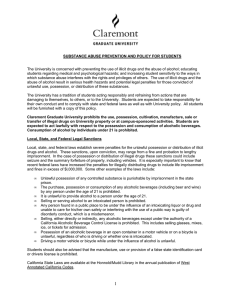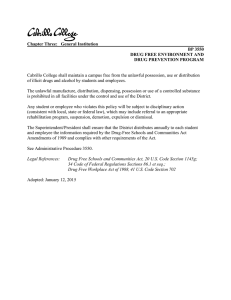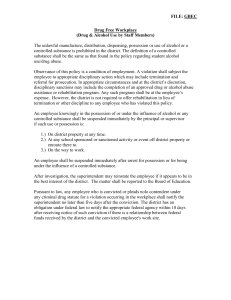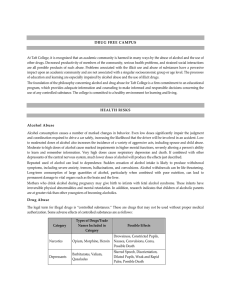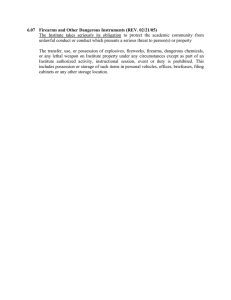CLAREMONT GRADUATE UNIVERSITY POLICY ON SUBSTANCE ABUSE POLICY
advertisement
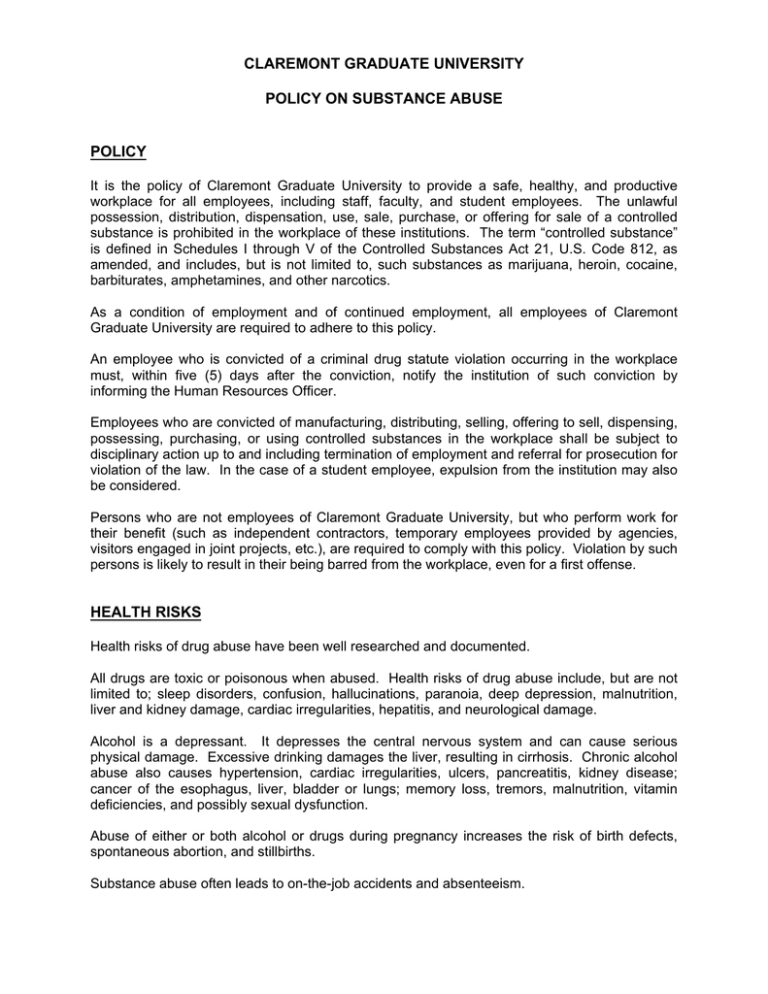
CLAREMONT GRADUATE UNIVERSITY POLICY ON SUBSTANCE ABUSE POLICY It is the policy of Claremont Graduate University to provide a safe, healthy, and productive workplace for all employees, including staff, faculty, and student employees. The unlawful possession, distribution, dispensation, use, sale, purchase, or offering for sale of a controlled substance is prohibited in the workplace of these institutions. The term “controlled substance” is defined in Schedules I through V of the Controlled Substances Act 21, U.S. Code 812, as amended, and includes, but is not limited to, such substances as marijuana, heroin, cocaine, barbiturates, amphetamines, and other narcotics. As a condition of employment and of continued employment, all employees of Claremont Graduate University are required to adhere to this policy. An employee who is convicted of a criminal drug statute violation occurring in the workplace must, within five (5) days after the conviction, notify the institution of such conviction by informing the Human Resources Officer. Employees who are convicted of manufacturing, distributing, selling, offering to sell, dispensing, possessing, purchasing, or using controlled substances in the workplace shall be subject to disciplinary action up to and including termination of employment and referral for prosecution for violation of the law. In the case of a student employee, expulsion from the institution may also be considered. Persons who are not employees of Claremont Graduate University, but who perform work for their benefit (such as independent contractors, temporary employees provided by agencies, visitors engaged in joint projects, etc.), are required to comply with this policy. Violation by such persons is likely to result in their being barred from the workplace, even for a first offense. HEALTH RISKS Health risks of drug abuse have been well researched and documented. All drugs are toxic or poisonous when abused. Health risks of drug abuse include, but are not limited to; sleep disorders, confusion, hallucinations, paranoia, deep depression, malnutrition, liver and kidney damage, cardiac irregularities, hepatitis, and neurological damage. Alcohol is a depressant. It depresses the central nervous system and can cause serious physical damage. Excessive drinking damages the liver, resulting in cirrhosis. Chronic alcohol abuse also causes hypertension, cardiac irregularities, ulcers, pancreatitis, kidney disease; cancer of the esophagus, liver, bladder or lungs; memory loss, tremors, malnutrition, vitamin deficiencies, and possibly sexual dysfunction. Abuse of either or both alcohol or drugs during pregnancy increases the risk of birth defects, spontaneous abortion, and stillbirths. Substance abuse often leads to on-the-job accidents and absenteeism. CGU Policy on Substance Abuse Page 2 LOCAL, STATE, AND FEDERAL LEGAL PENALTIES Local, State, and Federal laws establish severe penalties for unlawful possession or distribution of controlled drugs and alcohol. Upon conviction, these penalties may range from a fine to life imprisonment. In the case of possession and distribution of illegal drugs, these penalties could include the seizure and summary forfeiture of property, including vehicles. Recent Federal laws have increased the penalties for illegally distributing drugs to include life imprisonment and fines in excess of $1,000,000. Some other examples of the laws include: • Unlawful possession of any controlled substance is punishable by imprisonment in a state prison. • The purchase, possession, or consumption of any alcoholic beverages (including beer and wine), by any person under the age of 21 is prohibited. • It is unlawful to provide alcohol to a person under the age of 21. • Selling or serving alcohol to an intoxicated person is prohibited. • Any person found in a public place to be under the influence of an intoxicating liquor or drug and unable to care for his/her own safety or interfering with the use of a public way is guilty of disorderly conduct, which is a misdemeanor. • Selling, either directly or indirectly, any alcoholic beverages except under the authority of a California Alcoholic Beverage Control License is prohibited. This includes selling glasses, mixes, ice, or tickets for admission. • Possession of an alcoholic beverage in an open container in a motor vehicle or on a bicycle is unlawful, regardless of who is driving or whether one is intoxicated. • Driving a motor vehicle or bicycle while under the influence of alcohol is unlawful. AVAILABLE RESOURCES In order to help employees who are concerned with substance abuse, information about treatment programs and rehabilitation is available through the Employee Benefits Department in the Pendleton Business Building. Beginning January 1, 1991, an Employee Assistance Program was made available at no cost to all regular, benefit-based faculty and staff. The program includes individual or group counseling for adults, adolescents, and children, marriage and family counseling, alcohol and drug dependency counseling, and crisis/emergency counseling. The system is accessed by calling 1-800-234-5465 and a clinical coordinator will evaluate the problem and offer a list of providers who specialize in the program being presented. All records will be treated confidentially.
